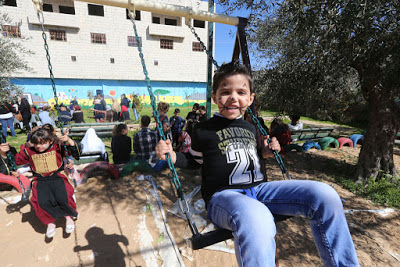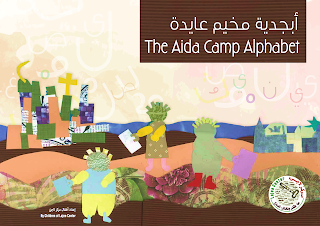If the New Statesman boycotts the Palestinians we should boycott the New Statesman
Statesman has long been identified with the Fabian Right of the Labour Party. In the 1930’s under the influence of the
Webbs, it became an uncritical supporter of Stalinist Russia, which it saw as
socialist. Censorship and the New
Statesman have long gone together. Wikipedia describes how, in
1938 under its longest serving editor, Kingsley Martin, it refused to publish George
Orwell‘s dispatches from Barcelona during the Spanish
civil war because they criticised the communists for suppressing the anarchists
and the left-wing Workers’ Party of Marxist Unification (POUM). These later became famous in Orwell’s book Homage to Catalonia.
wrote to Orwell, ‘that any hostile
criticism of the present Russian regime is liable to be taken as propaganda against socialism‘. Martin also refused to allow any of the
magazine’s writers to review Leon
Trotsky‘s anti-Stalinist book The Revolution Betrayed.
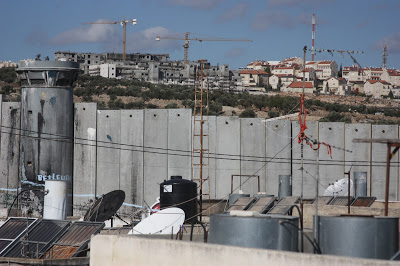 |
| The view from Aida refugee camp, the Apartheid Wall separates it from Gilo settlement on the hill above |
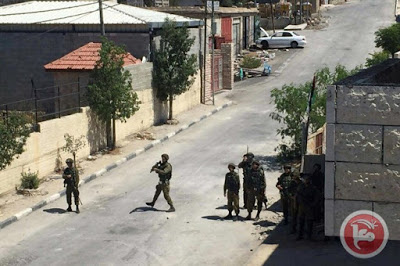 |
| Israeli forces raid Aida refugee camp Sep. 9. (Photos: Muhammad al-Azzeh) |
Despite this
record the New Statesman, with the endearing modesty for which it is famous, proclaims that it is
‘celebrated for its progressive politics,
scepticism, free thinking and the intelligence, range and quality of its
writing.’
its progressive politics, free thinking and humbug have not prevented it from
taking down from its web site a moving account of life in Aida refugee camp,
which is just outside Bethlehem. Aida is
surrounded by Israel’s Apartheid Wall, which has resulted in the confiscation
of much of its best land. The Wall is a hideous and ugly structure that
is taller than the Berlin Wall which the New Statesman regularly assailed.
Statesman was the traditional voice of the ‘enlightened’ wing of British imperialism
and it is no accident that Sydney Webb, one of its founders, later became
Colonial Secretary as Lord Passfield in the 1929-31 Ramsey MacDonald government. Whereas the Tories were open about the British
Empire being the basis of British power in the world, Labour’s imperialists spoke
the language of trusteeship, bringing civilisation to the backwards people, holding
the land in trust for them. Unlike the
Labour Left, the New Statesman steered clear of any whiff of anti-colonialism.
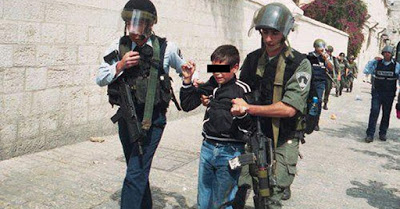 |
| A child is arrested and detained by Israeli occupation forces in Aida camp |
therefore, unsurprising that the New Statesman was for most of its history the
strongest supporter of the Israeli state.
Israel could do no wrong under a succession of fiercely pro-Zionist editors. Only in 1982 under Bruce Page and his
successor, in the wake of Israel’s invasion of Lebanon, did the New Statesman wake
up to the existence of the Palestinians and the transformation of Israel from an
oasis of socialism in the Middle East to a war-mongering and expansionist state
that was the close ally of US imperialism.
New Statesman editors removed was by Salah Ajarma, a well known Palestinian activist
and founder of the Lajee Cultural Centre.
The article is a factual account of conditions in the refugee camp and
the difficulty Palestinian youth face growing up in such an environment. Of course it is understandable that the Zionist
lobby would take exception to such an article since they deny that there is any
occupation. Although I haven’t read the Zionist
objections to the article, I suspect it revolves around ‘anti-Semitism’ which these
days is another name for the truth.
an earlier post, The
New Statesman & the Perpetuation of the Myth of Labour ‘anti-Semitism’ Carrying
on a tradition – The New Statesman, Zionism and Imperialism the New
Statesman has given full support to the ‘anti-Semitism’ smear campaign in the Labour
Party.
mythology, Israel is merely reclaiming the lands it lost 2,000 years ago from
the indigenous population! The Palestinians,
like all native peoples, are invisible except when they engage in resistance,
which the Zionists term ‘terrorism’. The
traditional Zionist attitude was summed up in the slogan ‘A
Land Without a People for a People Without a Land.’
Solidarity Campaign statement below states, having commissioned and put Salah
Ajarma’s article up on its web site, as part of a partnership agreement between
the New Statesman and PSC, the NS then took the article down again after objections
by two Zionist blogs. What is
particularly damning is that instead of explaining their reasons, the New
Statesman has refused to even communicate with PSC or Salah.
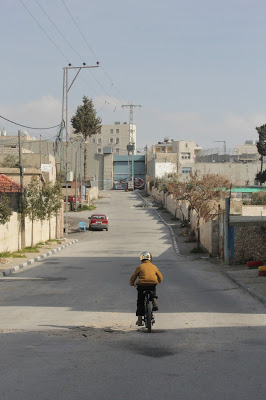 |
| Aida refugee camp with the Wall ahead |
of the New Statesman is not an isolated example of political cowardice and
concessions to Zionist settler colonialism.
In recent years the Guardian has undergone exactly the same
metamorphosis such that it has been the leading campaigner in support of the ‘anti-Semitism’
smear campaign. The liberal left is
reverting to type as the Western ruling classes firm up their support for Israel. The election of Donald Trump has been greeted
with utter delight by Israel’s far-Right.
See for example Israeli
Right hails Trump: ‘The era of a Palestinian state is over’ .
Statesman should be unequivocal. We
should support a boycott of this miserable paper that claims the affections of
the Left.
Palestinian voices
are being censored and silenced. We cannot let
this happen.
Earlier this month PSC commissioned an article from
Salah Ajarma, the co-founder and Director of the Lajee Cultural Centre in Aida
Refugee camp. The New Statesman published the piece as part of a two year
partnership between the PSC and the New Statesman. Two pro-Israel blogs attacked the New
Statesman for publishing the piece, shortly afterwards, the New Statesman
deleted it without speaking to Salah or to PSC. They have since refused to
offer any explanation or justification for the removal of the article.
This is a disgraceful attack on freedom of
expression, a clear case of censorship, and a deliberate attempt to silence
Palestinian voices. By doing this, the New Statesman have politically censored
a human rights campaigner, who is living under very harsh conditions of
military occupation in a refugee camp. We cannot stand by and let this happen. We cannot be silenced.
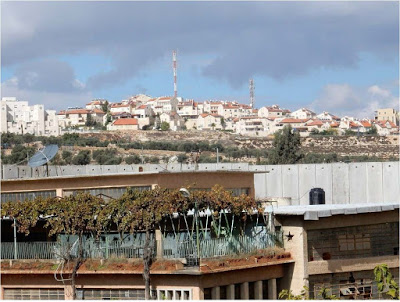 |
| The red sloping roofs and lack of black water tanks identify the hilltop town as an Israeli settlement. It overlooks the Aida Refugee Camp, separated from it by the Wall. |
political pressure to remove the article, and do not believe they owe Salah or
PSC the courtesy even of a conversation: the editorial team won’t even take our
phone calls. In an email to the PSC, the New
Statesman stated that the article had been removed as a result of ‘reader
complaints’, refusing any further elaboration and any editorial contact.
Salah’s article describes
the experiences of young Palestinian refugees in Aida camp and talks about how
settlements impact his life and the lives of people in his community. New Statesman editors approved and published the
article.
The New Statesman’s actions are political censorship of a Palestinian human
rights campaigner. We cannot
stand by and let this happen.
This action does not align with the stated goals of the New Statesman to “hold
our leaders to account and tell the stories that the world needs to hear”. What is happening in Palestine is a
story that the world needs to hear, and the account of a Palestinian should not
be censored. The lack of explanation and refusal
to speak to the Palestine Solidarity Campaign or Salah goes against all good
journalistic standards and common courtesy
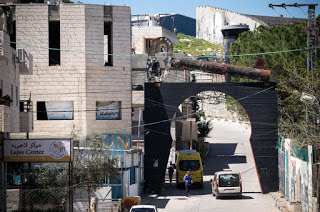 |
| A giant key (said to be the world’s largest) sits atop the entrance to the Aida Refugee Camp in Bethlehem, reminding residents to insist on their “right of return.” |
We did not want to make this public,
we attempted to resolve the problem directly with the New Statesman, giving
them the benefit of the doubt and attempting to speak to editors countless
times.
However, we have now been told that the editors will not speak to us and that
the decision to remove the article would not be explained or reversed.
We have a duty to
stand up for justice, honesty, and integrity and so we must raise our voices
about this.
Please join us
to demand that the New Statesman
- Republish
the article - Offer
an apology to Salah Ajarma for removing it without good cuase - Make a
clear public statement as to your commitment to upholding the principle of
freedom of expression
write to the editors of the New Statesman now – and show them that we
will not be silenced and will not allow Palestinians to be censored.
In solidarity,
The team at PSC
Settlement Regime by Salah Ajarma
November 18, 2016
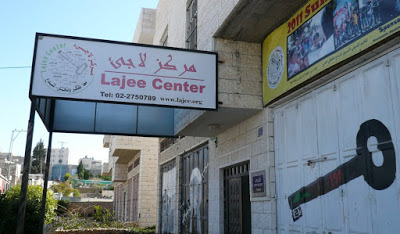 |
| Lajee Cultural Centre |
Ajarma, the cofounder and director of Lajee Cultural Centre in Aida Refugee
camp.
refugee camp, in which I live and work, is on the edge of the famous town of
Bethlehem. Our families established the camp in 1950 after being forcibly
expelled from their homes by Zionist militias in 1948. Palestinians from our
camp originate from villages in the Jerusalem and Hebron districts, just a few
miles down the road. Those born since, still live in the refugee camp, and
continue to struggle for the right to return to our homes.
2000, me and a number of friends established the Lajee Centre, a community-based
cultural centre for young refugees living in the camp. Through it we have
sought to provide opportunities for the cultural, educational and social
development of our young people, despite the violent military occupation under
which we live. As an occupied refugee people, we are aware of the duty to
educate our youth about their history and their rights. Only in this way will
our struggle for freedom be carried to the next generation.
Israel’s government began the construction of its illegal wall.[1] Its
consequences are now perhaps well known – land confiscation, ghettoization, and
an accelerated ethnic cleansing of Palestinians. In Aida the wall has been
particularly obtrusive with its towering concrete blocks built directly
opposite the Centre. The young people I work with have only ever known a life
surrounded by this wall and under the constant surveillance of its ominous
watchtowers. Before its construction, families and children would spend time in
nature, in the olive groves that neighboured the camp. As one of the few green
spaces available to us, I would often go there for picnics with my family when
the weather was warm. This has now been shut off from us, creating a menacing,
stifling atmosphere that we cannot escape. On the hill opposite, Israel’s
illegal settlement of Gilo continues expanding onto land confiscated by the
wall.
October 2015, Aida Camp buried one of its sons, Abd al-Rahman Ubeidallah, who
was shot in the chest by an Israeli sniper. He was 13 years old and killed on
his way home from school. His peers, almost without exception, have all been
arrested, beaten or fired upon. The head of Lajee’s film unit, Mohammad, was
shot in the eye with a rubber-coated steel bullet whilst filming Israeli
violations in the camp in 2013. We are routinely broken into by Israeli
soldiers and border police who invade the camp, firing teargas indiscriminately
and threatening our families over loudspeakers.
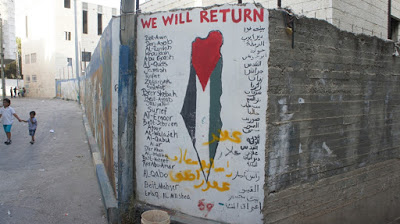 |
| Mural in Aida depicting the Palestinian villages and towns from which the camp’s residents were forcibly displaced after the Nakba in 1948 |
intolerable conditions are particularly difficult for our young people who, in
the midst of such cruelty, maintain an extraordinary optimism. It is difficult
to understand how children raised in such an awful situation can remain so full
of gentleness and hope. Lajee is always alive with laughter, dancing and
singing and our youth have transformed this dreadful situation into a boundless
love for our people and an insistent demand for freedom. Their resilience never
ceases to inspire me, and it is for their future, and the future of my two
young daughters, that I continue my work. These young people deserve to live
with dignity and peace.
in Lajee has found support from around the world. From the UK there has been a
steady stream of delegations – teachers, trade unionists, students, doctors,
politicians and academics – who have visited our Centre. Early this year I came
to the UK with our dabke troupe, performing traditional Palestinian dance to
packed out venues up and down the country. When Celtic supporters raised funds
for Palestine in anticipation of a UEFA fine, it was to our football club that
they donated over £79,000. Our experience of the generosity of the British
people has left us in little doubt as to their values and their willingness to
stand in solidarity with our just case.
cannot be said of the UK Government. As Palestinians, we know all too well the
dishonourable history of Britain in our region, a legacy that has yet to be
resolved. The UK Government, like many others, continues to support the
discredited ‘peace process’ whilst taking very little meaningful action.
Nowhere is this more evident than in the case of Israel’s continued
construction of colonial settlements. The UK regards settlements as illegal and
a barrier to peace, whilst nevertheless continuing to trade with them.[2] The contradiction
between their stated aims, on the one hand, and the on-going financial
relationship between UK-based companies and charities, on the other, has led to
the longstanding perception amongst Palestinians that the UK Government is not
serious about its desire for peace. What other explanation could there be for
this inconsistency?
talk of peace is contradicted by our daily experience of an oppression that
receives significant material and financial support from the ‘international
community’. That the collective efforts of the EU, the US and the UN have
failed to even freeze the construction of settlements, never mind begin to
dismantle them, feels indicative to Palestinians of the regard with which our
rights are held. Settlement construction has become a touchstone issue because
it reflects the reluctance of the international community to take even the most
minimal action to check the relentless march of Israeli colonisation.
different strategy, one in which the international community takes measures to
pressure Israel into meeting its obligations under international law. Ending
settlement trade is the place to start as there is already broad international
agreement on their illegality. This international consensus needs to be
actualised by halting the building of settlements and dismantling those already
constructed. This would lay the foundation for a just peace in which the rights
of the Palestinian people to national self-determination and to return to their
homes can be realised.
Aida, on the frontline of Israel’s settlement regime, the situation is urgent.
Ending trade with settlements would deny Israel the means of maintaining their
occupation and give us some relief from its immediate, choking effects. This
would provide our children and us with the first glimmer of hope for a future of
justice, dignity and peace.
of Justice: Legal Consequences of the Construction of a Wall in the Occupied
Palestinian Territory.
[2] Trading Away Peace: How
Europe Helps sustain illegal Israeli Settlements.
